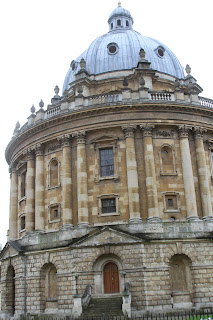This blog entry marks my 412th blog entry. That number is not notable for any reason other than it is a Pittsburgh area code and Pittsburgh always brings back fond memories.
In the US, the only international universities that I think we hear about (before graduate school or study abroad) are Oxford, Cambridge, and maybe Sorbonne (France). This is likely because we are not considering attending an international school, but why then, do we still know those two English universities? Prestige? History? There have to be other international universities that have been as successful. My best guess is that it is because the USA was once a British colony. Beyond universities, I've been amazed at just how many things that I experienced in the USA were easily recognizable in Britain culture as well, though I don't know if they were developed in the USA, in Britain, or separately in both.
Bodleian Library in Oxford
Radcliffe Camera
The architecture of every college seems to be taken out of a photographic collection of what you imagine universities should be - beautiful buildings and grounds that are meant to inspire. Coming from an urban campus at the University of Pittsburgh (an experience I loved), I have always been taken by classical campuses like this. Each college had a front quad with a small patch of manicured grass in the middle. One person said that the reason the buildings look so good is that they have been used for so long. In my mind, that means they might be a little run down. However, that person suggested that because some of these buildings are 500+ years old and have been used that entire time, they have learned how to prioritize proper maintenance.
All Souls College and Radcliffe Camera.
Bridge of Sighs
The back of New College
There was so much bike parking.
My favorite memory of Oxford, but might be trying to get there. KLS, smartly, was trying to me to park outside of the city. I felt that we should go to our destination and then back out to find the closest spot we could. Well, it turns out that the center of Oxford is a biking city. The roads are closed to cars, but buses still run on those some roads. Because there is no clear division, you can follow those buses right into the city, which is EXACTLY what I did even though you are not allowed to be there. For a few moments, I was appreciating the amazing bike to car ratio until I eventually saw a sign and figured out that I needed to pull a U-turn and get out of there in a hurry. When we walked back into the city after parking, I saw numerous signs explaining that the roads were closed ahead.
Dominus illuminati mea, carved into the stone below the clock, is the University of Oxford's motto.
A typical front quad of one of the Oxford colleges.
After visiting Oxford, KLS and I headed over to Bletchley Park on a tip from my brother David. During WWII, Bletchley Park was a secret base that decrypted enemy transmissions. The work done at this base is believe to have saved thousands of lives and shorted WWII by two to four years. Alan Turing and this base were recently brought back into the spotlight by the movie The Imitation Game, which was partly filmed on site. The museum shows how the systems to break the German cyphers efficiently were slowly developed and then how the day-to-day translating was done quickly with those systems. The systems they built for breaking codes included Colossus, a system that shares a competing claim as the world's first computer.
This was the best museum I went to in England and I'd highly recommend it for any code breaking, computer science, or WWII buffs.
Bletchley Park mansion
A functioning replica of the Bombe machine, which helped break the transmissions from the elusive German Enigma machine.












No comments:
Post a Comment